best vpn singapore
The #1 VPN provider absolutely goes to ExpressVPN – with military grade encryption, solid security and ultra-fast servers, it truly is the best VPN choice overall!
To remain truly free on the internet, you can’t go without a VPN equipped with impenetrable security. Here, we shortlisted the top 8 VPNs for Singapore with strong encryption and no leaks from DNS and WebRTC tests, aside from just having stable connection speed.
Top VPN for Singapore
- ExpressVPN – Best overall VPN
- Surfshark – Best cheap VPN
- NordVPN – Best VPN for online privacy
- CyberGhost – VPN with most servers
- TorGuard – Best VPN for torrenting
- IPVanish – Best VPN for multi-device
- ProtonVPN – Best Swiss-based VPN
- FastestVPN – Best VPN for streaming
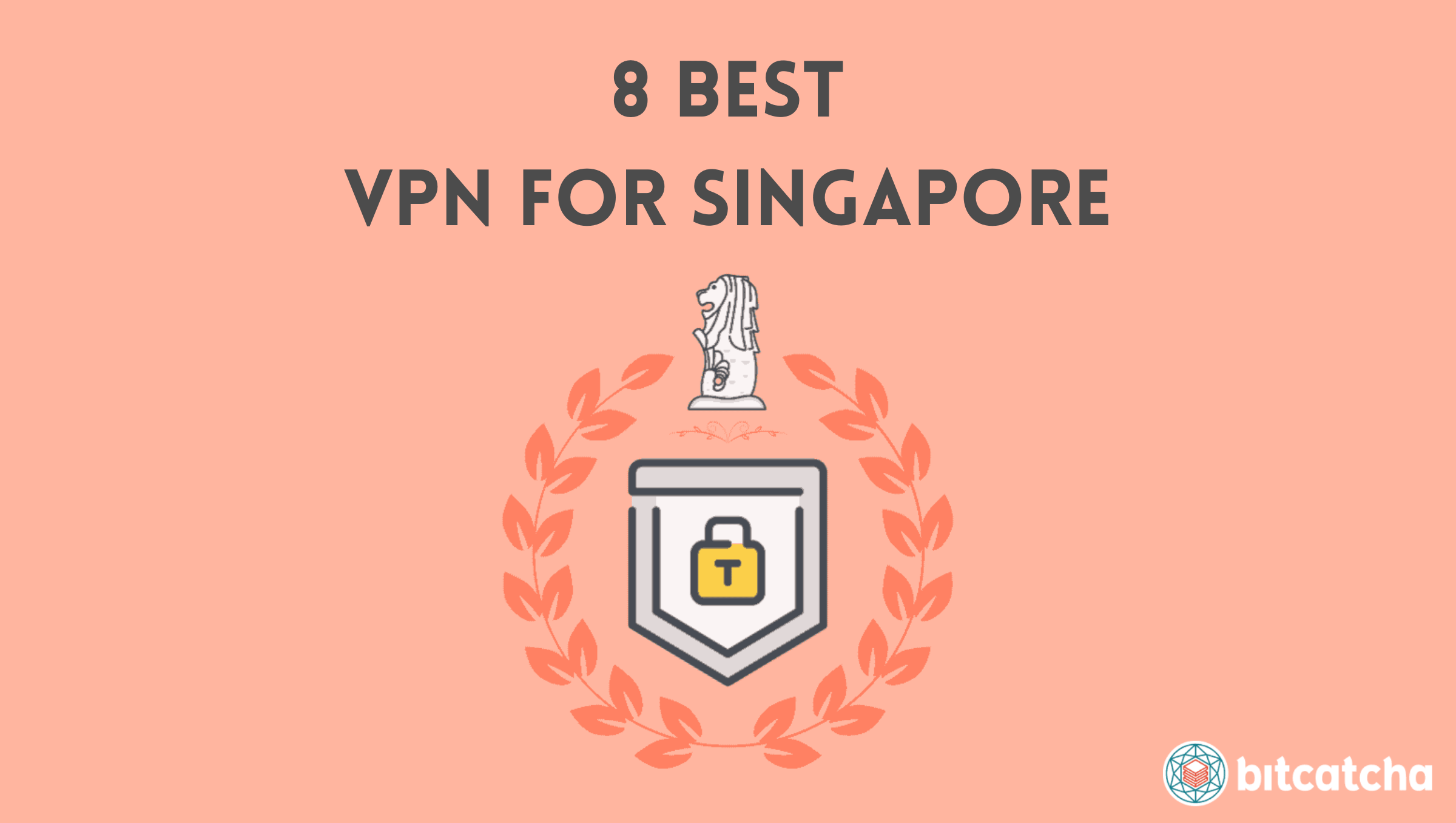
note
The Singaporean prices in this article are calculated using an exchange rate of 1 USD to 1.35 SGD.
Before going through my test results, here I’d like to establish a baseline speed for my Internet. The following is my actual broadband speed based on a service line of 500Mbps, without a VPN connection active:
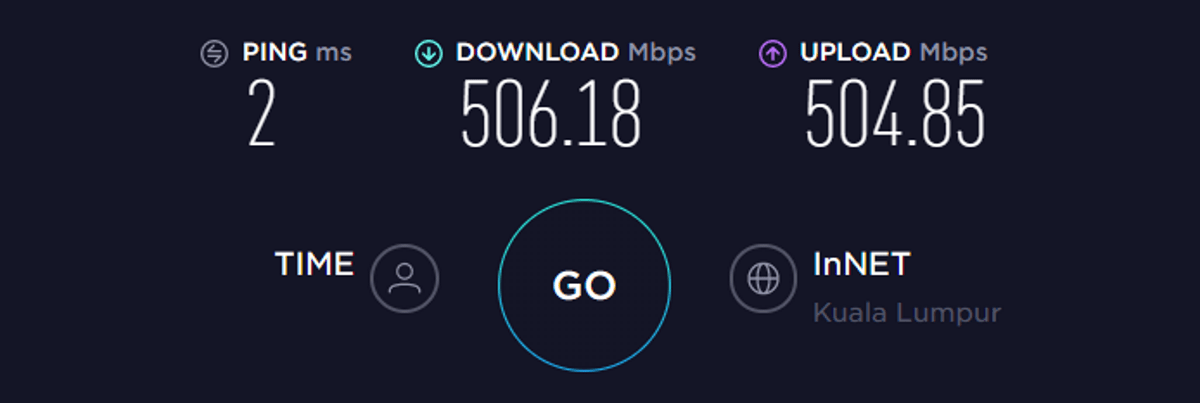
Singapore server speed tests are normally the easiest for me since I’m in close proximity. That combined with excellent infrastructure in the country means that Singaporeans can take these performance figures quite literally.

1. ExpressVPN
https://www.expressvpn.com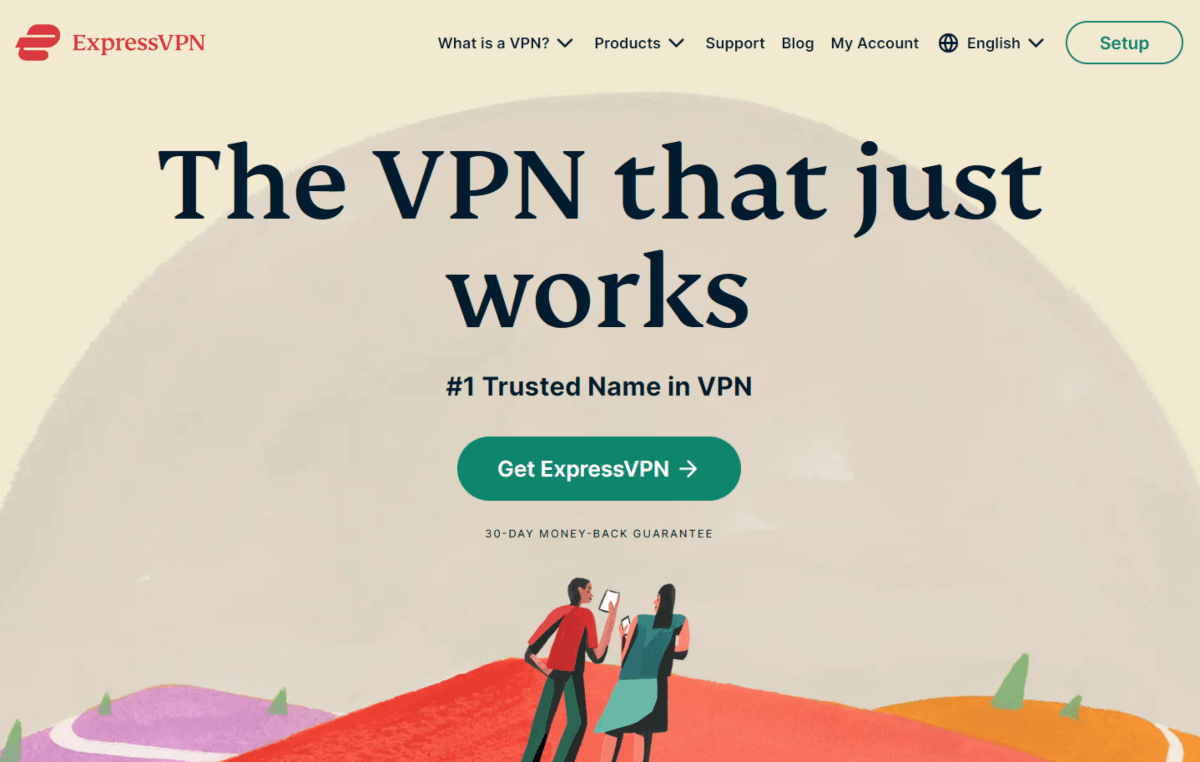
ExpressVPN earns top spot on this list for many reasons. With servers in 94 countries (almost double some other VPN services!) and unlimited bandwidth, ExpressVPN can open up a world of content. It works seamlessly with US Netflix and the easy-to-use apps make it simple to stream content on any device. You can bypass content-based throttling, government censorship, or blocking by schools and offices.
I know that the first thing Singaporeans will scream about when it comes to ExpressVPN is their pricing. But consider this, you not only get 24/7 support from actual humans (and we hear that if you do have an issue, it often gets resolved in minutes), you get a very streamlined experience right out of the box—no headaches necessary.
Keeping that in mind, you’ll also be happy to know that ExpressVPN places performance as a top priority as well and has strong stable speeds across all their servers. Appreciate it for what it offers and you’ll have silent protection running in the background at all times – you will hardly know it’s there.
I have seen many VPNs excel in one or two areas only to fall flat in others and I was wondering, at the end of the day, why would I as a user want to tie myself in with a service that couldn’t perform as reasonably as could be in as many areas as I needed it to?
ExpressVPN excels in every area you want a VPN to perform. For that reason, as well as its stellar reputation in VPN circles (certainly well deserved), I have no hesitation to recommend them as Bitcatcha’s top VPN.
Read our in-depth review on ExpressVPN to see why it’s Bitcatcha’s #1 VPN!

(See full speed test result)
As we see from the speed, it may not match my ‘naked’ line speed (the extra protection offered by using any VPN will slow your speeds a little), but Singapore infrastructure certainly gives it a leg up. ExpressVPN is also known to be able to manage relatively stable speeds across many of their servers, so you are not likely to be stuck with a single location.
It might not be the cheapest, but sometimes you truly get what you pay for. Many free and cheap VPNs sacrifice on your speed, your security, or even sell your data on to advertisers. Not so with ExpressVPN. As a fantastic balance of price, performance, and protection, this VPN service is a triple threat that’s worth the price tag.
Exclusive Deal
Get 3 Extra months free on ExpressVPN’s 12-month plan. Learn More

2. Surfshark
https://surfshark.com/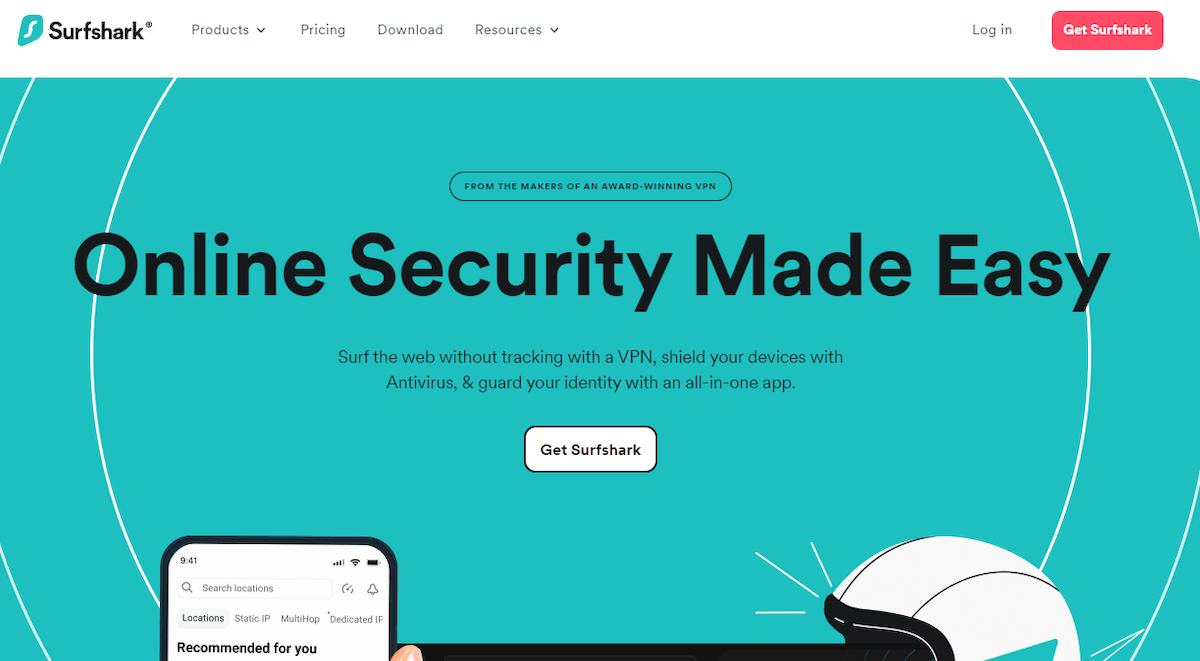
Surfshark may be one of the newer VPN providers around but it has managed to meet quite high expectations very quickly. They’ve gone from 0 to having over 1,000 servers in 61-odd countries in no time at all with more to come.
What made them even more impressive was the fact that they did all of this seamlessly. My first experience using Surfshark was trouble free and I’ve maintained my own account with them ever since. So far there have been no connection or service issues and I did note reasonable app updates from time to time.
Singaporeans who are budget conscious will especially appreciate Surfshark’s no-frills attitude when it comes to the VPN service – a good price for exactly what a VPN service should be – without charging for unwanted (or unneeded) extras.
The fact that they’re able to also hide P2P traffic on all servers gives them a big plus as well.
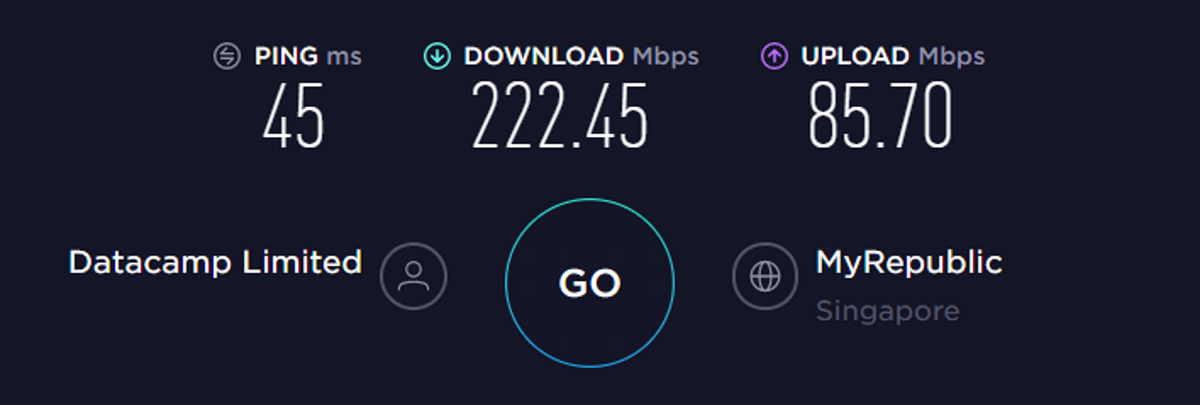
(See full speed test result)
Although Singapore VPN traffic might not be faster on Surfshark than some other providers, where it excels is in its stability. Surfshark speeds are constant across almost all their servers. This makes them an idea choice for a VPN since it isn’t likely you’ll be sticking to one country server all the time, right?
Still, 200+ Mbps for a shared line VPN isn’t something to sneeze at and unless you plan to only use a single location at maximum speed, the consistency found here is a major boost. Of course, their low pricing makes them a very attractive pick as well.
Learn more of its excellence at our thorough review on Surfshark!

3. NordVPN
https://nordvpn.com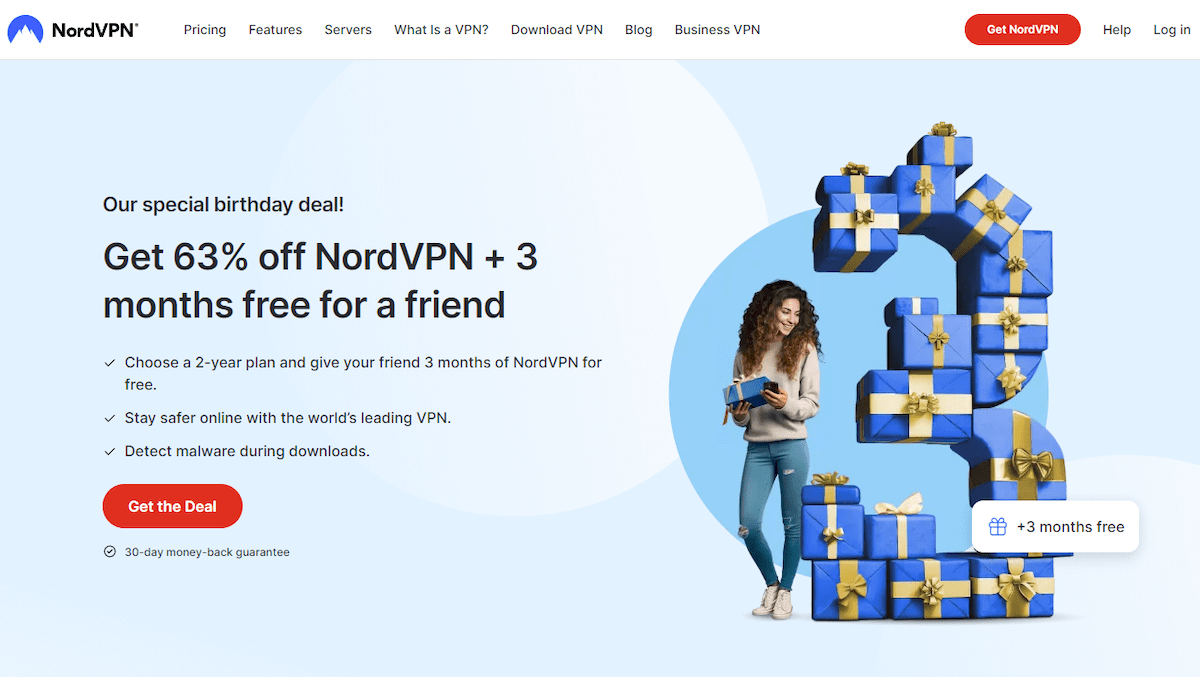
I think I can safely say that among all the VPN providers I’ve looked at, NordVPN easily comes out top in terms of sheer geographic scale and raw performance. It has a spread of over 5,000 servers in 59 countries with even a good number of those being in the Asia Pacific region.
You can rest assured your privacy is in good hands as it has a strict no-logging policy, so your data won’t be kept. NordVPN is based out of Panama, which doesn’t really have any data retention laws to speak of.
The connection can also be as secure as you want since NordVPN supports not only 256-bit encryption but also has something called ‘double VPN’. This means that you connect to a VPN server and then bounce that connection off another before heading to your destination address.
Paranoia, perhaps, but if your government is KNOWN to be legally spying on you, wouldn’t you rather be paranoid than face the law for unknown reasons?
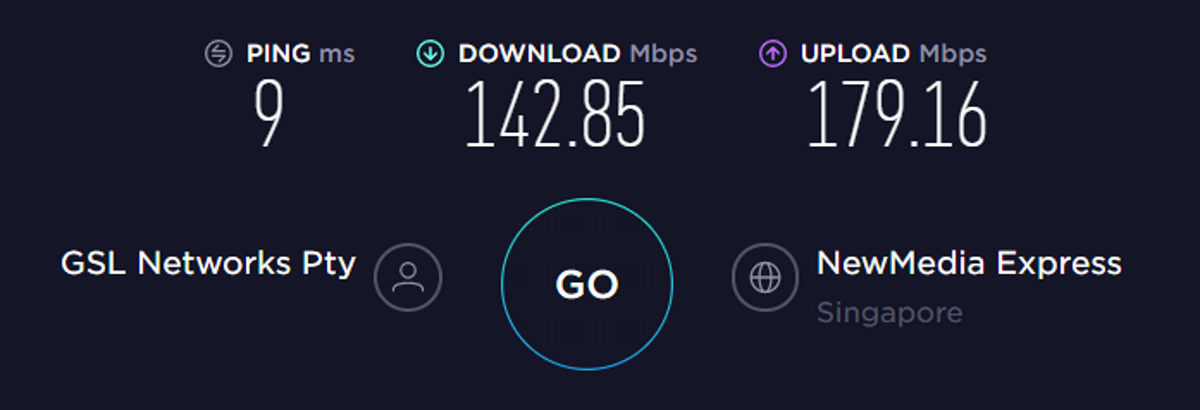
(See full speed test result)
Singapore servers from NordVPN were extremely good as far as connections go and speeds were impressive, both upload and download. They also have specialty P2P servers that are optimized for this type of traffic.
Here’s the real kicker – Singaporeans, I know you love a bargain and if you’re willing to commit to NordVPN long-term it will love you right back with its excellent prices. With their three-year subscription prices drop significantly and are some of the best I’ve seen in the market.
Read our in-depth review on NordVPN to see why it’s one of Bitcatcha’s top VPN recommendations!

4. CyberGhost
https://www.cyberghostvpn.com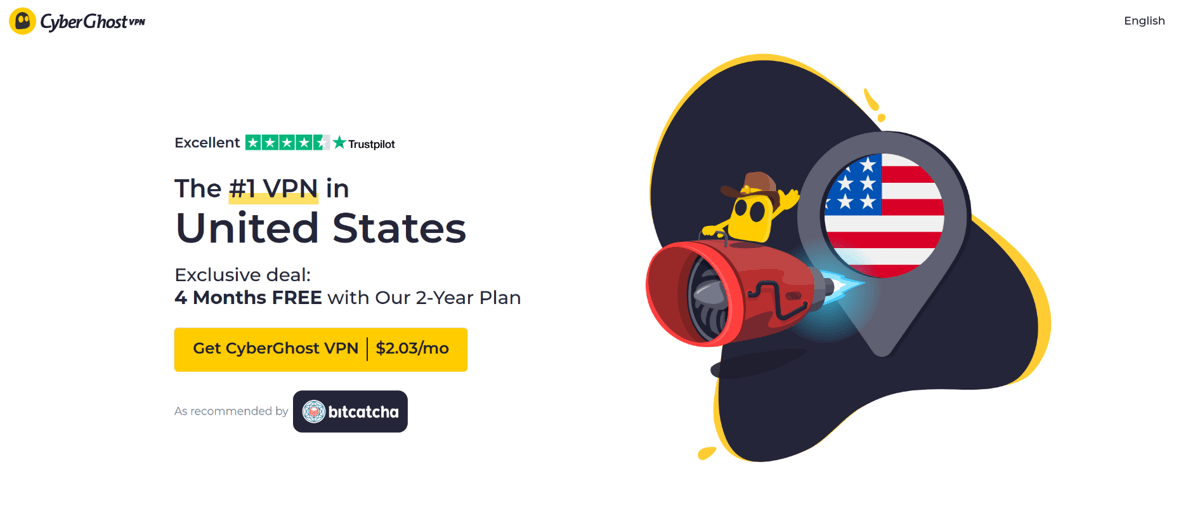
CyberGhost is quite well known in the VPN industry but to be very honest, I didn’t think much of it when it first came across my desk. Today however they’ve turned night into day and bumped up performance by so much it should be illegal.
That’s right, CyberGhost has been on a rapid expansion spree and their global server network today is simply staggering. Of course, that means mostly great speeds and this is an area that Singaporeans don’t have to worry about in-country.
In fact, their US presence is great as well, so you can Netflix and game to your heart’s content. Speeds are also great for P2P and knowing the Singapore government, you’ll need to run CyberGhost while torrenting.
Strangely enough, one of the highlights of this service is their nice snappy app and extremely friendly marketing team which makes getting even email from them such fun. I’m not the kind to usually harp on this, but their communications and marketing team has pizazz.
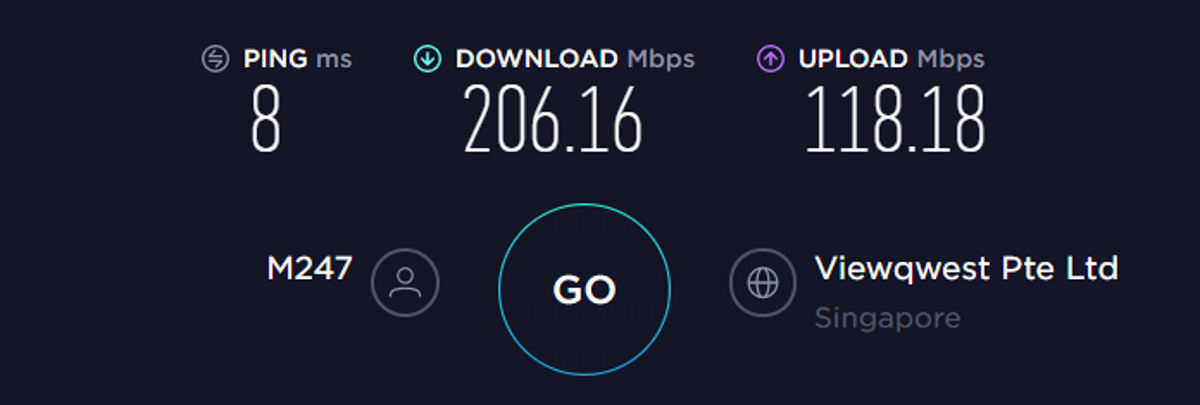
(See full speed test result)
Speed-wise, while I managed to get pretty awesome speeds from them from Singapore, as expected. Plus with such a strong network I don’t think you’ll need to be overly concerned about server congestion for quite some time to come.
Again, CyberGhost must love Singaporeans since they throw in a lot of extra freebies as well. These include numerous security features and add-ons such as ad-blocking that come with the deal.
Like NordVPN, CyberGhost has excellent long-term pricing options which drops your monthly commitment down to as low as $4.61 a month.
See our full review on CyberGhost to learn why it one of our top picks!

5. TorGuard
https://torguard.net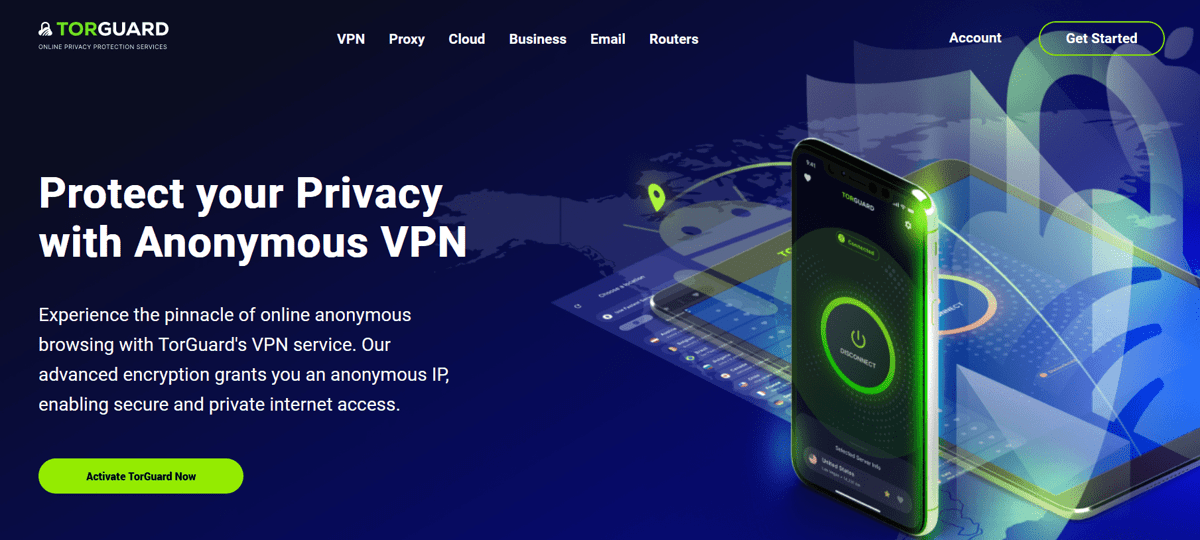
I was first attracted to TorGuard due to its marketing as being a P2P-friendly VPN service provider but once I had installed the Windows client that soon turned to wonder if perhaps, I’d made a mistake. This was caused in a way by its rather dated looking interface.
This VPN doesn’t come with a lot of the modern marketing bling that grace its contemporaries, but I soon found out that in performance was where it excelled. This is highlighted by it having grown to provide over 3,000 IPs in more than 50 countries.
With P2P support as its foundation and a host of other outstanding qualities – stable speeds, deployable even on routers, enhanced security services and even the ability to bypass VPN blockers – I would say that TorGuard is at or near the Top, especially for Singapore-based users.
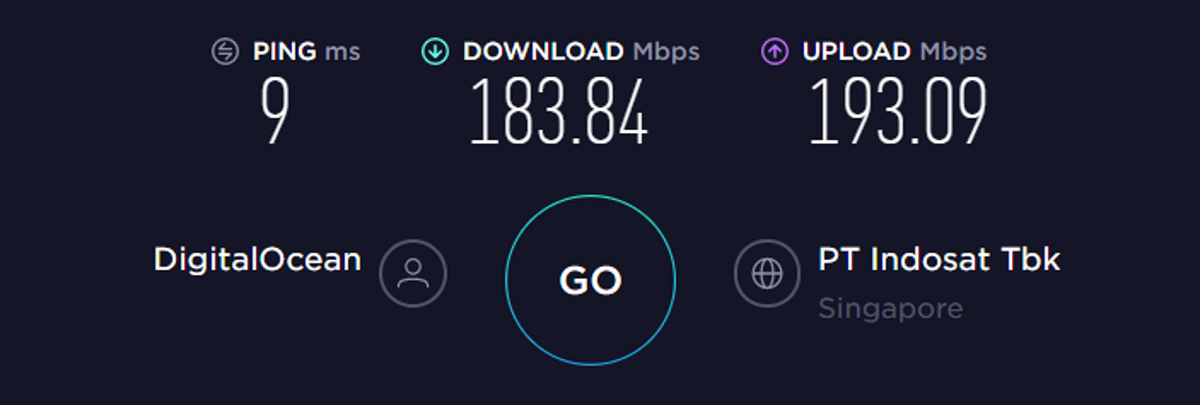
(See full speed test result)
As you can see, even with a solid downstream speed, I was able to even boost my upload speed from my baseline. This, while not something everyone might want, or need could be useful for P2P users in some cases (maintain those ratios!).
I feel that the only major downside of this VPN service lies in its old-fashioned user interface and it’s lack of good (or should I say outstanding) prices for longer-term customers. Nevertheless, prices still fall in the low range of top-tier VPN providers.
Read our thorough analysis on TorGuard for more information!

6. IPVanish
https://www.ipvanish.com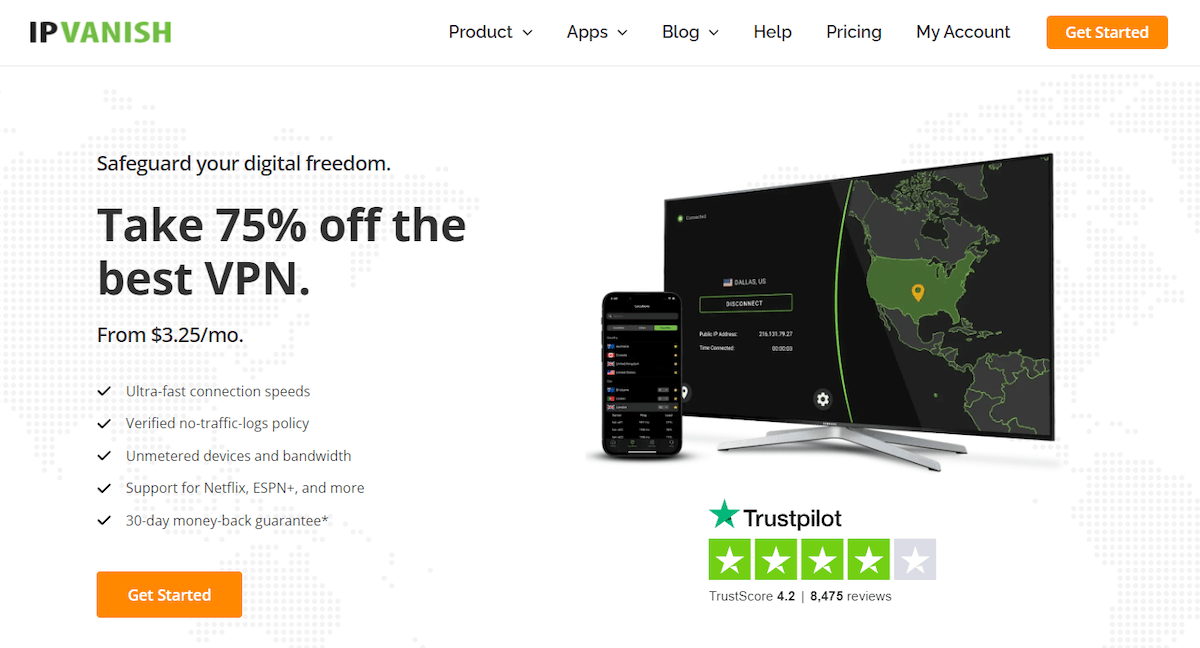
If it were based purely on history, I would never have let this VPN onto our list of Best VPNs for Singapore. IPVanish has in the past been accused of providing user logs to authorities in year 2016, and that’s a major no-no as far as VPNs are concerned. While that is bad enough, the new owners of IPVanish tried to sweep the incident under the carpet by saying they had no knowledge of prior incidences that might or might not have occurred.
To sound what might be their final death knoll (I know Singaporeans love to complain!) is their customer support, which is absolute rubbish. I live in Malaysia and even I am disgusted by the level of support which IPVanish provides its customers.
However, IPVanish performs surprisingly well in Singapore-based speed tests AND combines that with forced 256-bit encryption. Though some of you may be thinking that you don’t need that level of encryption, we can say that it’s saving you from your own folly (perhaps).
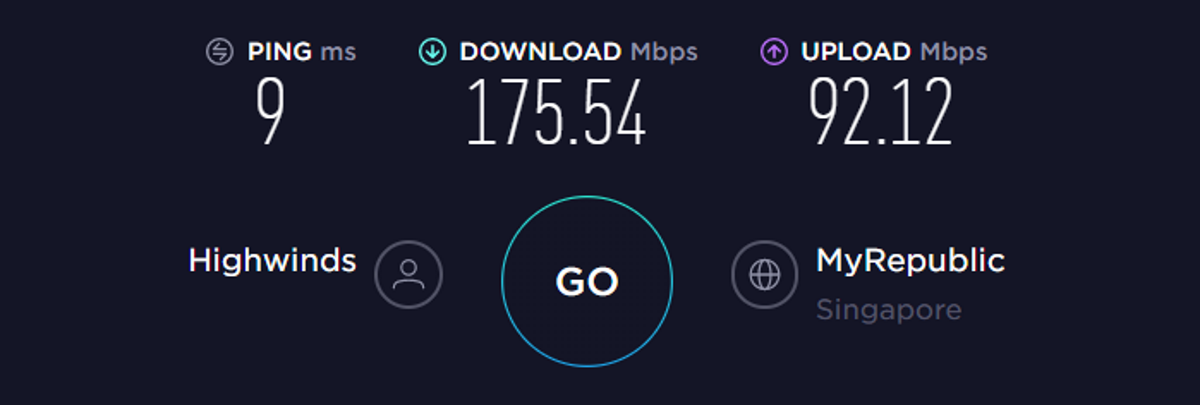
(See full speed test result)
Both uploads and downloads are remarkably fast on IPVanish servers and there was no complaint here. However, issues I had with their speed to Malaysia-based servers was where their customer service really got to me.
The difference in levels of increased performance combined with their terrible customer service makes IPVanish a real hit or miss. I would ask you if you are prepared to take the chance it will work fine out of the box for you. If you think so, that’s great. If not, you might have to end up demanding a refund.
Read our in-depth review on IPVanish to find out more!

7. ProtonVPN
https://protonvpn.com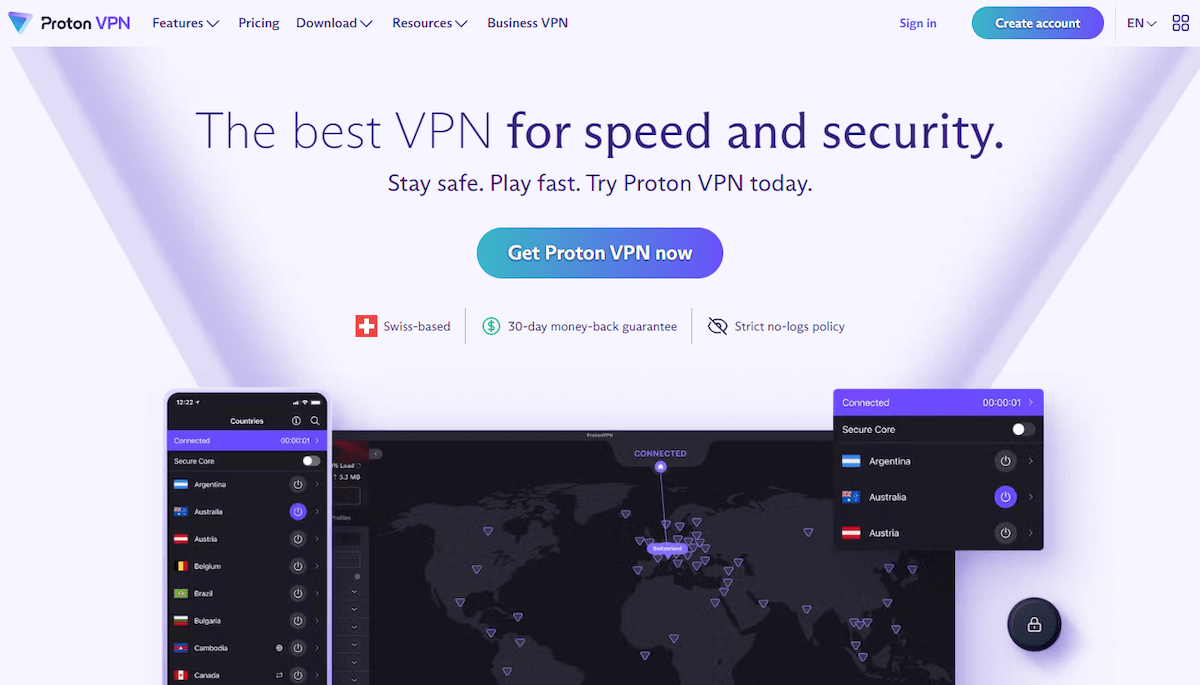
ProtonVPN is based out of Geneva, Switzerland, and has been around for some time now. Yet despite a lot of conversation seen about them, slightly weak marketing seems to be a bit of their pain point.
Yet despite a more limited network compared to may not providers they do show some decent numbers in speed tests – depending on location. Their speeds in Singapore are good, plus Singaporeans can also access a fair number of regional servers nearby.
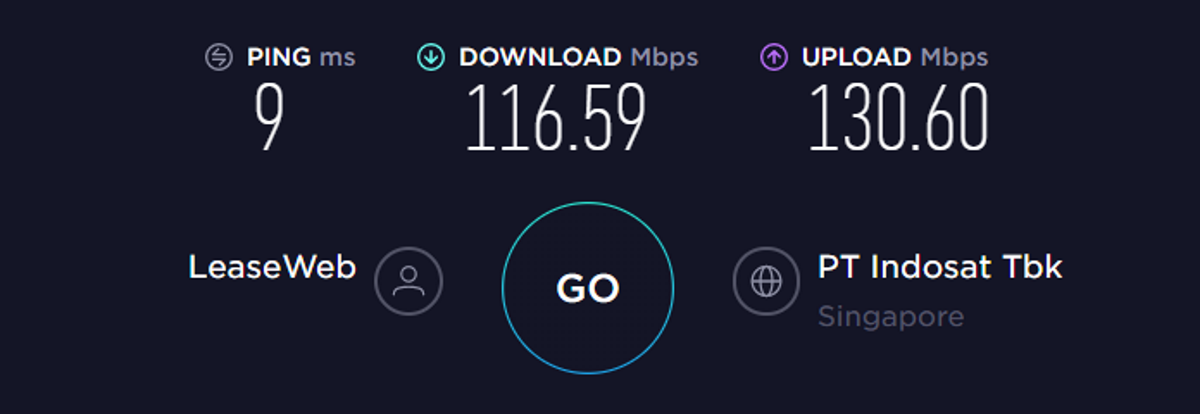
(See full speed test result)
To be fair though, the speeds (even though quite good) aren’t the best we’ve seen which accounts for them slipping so many places in my rankings. Of course, that is keeping in mind that we expect quite a lot for our money! Speeds to an in-country server were noted at areound 116 Mbps.
In the past there was a downside for younger users since the original ProtonVPN interface looked like something from the past. Today they have it in a sleek, futuristic map laid out nicely within the application frame.
Read our complete ProtonVPN review for more information!

8. FastestVPN
https://fastestvpn.com
With a number that makes such a bold claim, FastestVPN came under my targeting crosshairs with a vengeance in the past and I’m unashamed to say I bashed them well. However, taking a re-look at the service of late I found that they have actually improved on the service quite a bit.
Add to that the fact they’ve managed to keep prices extremely as well – it’s only $2.74/mo on their 3-year plan. While it’s true that the FastestVPN network may be quite limited, Singaporeans in general don’t have this issue for any VPN provider I’ve come across yet – thanks to your strong location in context of Asia Pacific region data traffic.
This latest iteration of FastestVPN also seems to have resolved many earlier problems such as the hiccups in service when trying to use Netflix. Now, everything streams just peachy and at these speeds – enjoyably so.
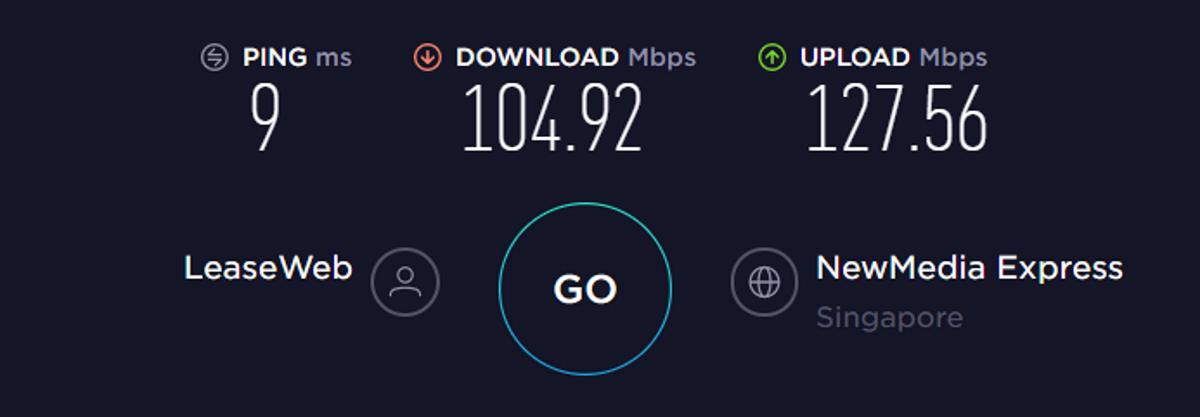
(See full speed test result)
Speeds on FastestVPN when connected to a Singapore server for me exceeded 100 Mbps. While not the best, that is certainly a mark up from where they used to be in the past. Combined with their great pricing, bargain hunters can opt for this to get a great deal.
Head over to our FastestVPN review to learn more!
What Is A VPN?
Virtual Private Network, or VPN, are private networks of servers. They help users increase digital privacy while adding additional layers of security at the same time. They can be used by both businesses and individual consumers.
In a business context, VPNs are often established by companies or specialized service providers to enable secure access to confidential information for remote employees. From an individual consumer or small business perspective, VPNs are more easily accessible and affordable.
The primary goals remain privacy and security, achieved by routing data through secure VPN servers and masking the user’s origin and device details. Additionally, VPNs encrypt data to prevent unauthorized access or theft during transmission.
Why Use A VPN In Singapore?
Singapore has long been known to be a country with rather draconian laws and very unfortunately this has in a way resulted in it becoming an advanced surveillance state.
Coupled with its close relationship to the United States in reference to the “United States-Singapore Free Trade Agreement”, residents in the city-state have good reason to be edgy about their online privacy and anonymity.
Among all the countries in the world, perhaps Singapore is one of those near the top of the list when it comes to the necessity of using a VPN service. At least for now, while it is still legal there to use one.
Singapore Government Legally Uses Spyware
While Singapore seems to many a bastion of democratic process and judicial independence, few know that details in the constitution of the country grant its government extraordinary rights over its citizens and residents. This is markedly so when it comes to digital activities especially when it comes to privacy.
The Singapore constitution does not specifically include any right to privacy and other bylaws leverage on that fact to empower certain government bodies the right to intrude on the activities of private citizens online, according to “The Right to Privacy in Singapore”. These include the “Criminal Procedure Code (Amendment) Act 2012” and the “Computer Misuse and Cybersecurity (Amendment) Act 2017 (Commencement) Notification 2017”.
In a more casual manner of speaking, Singaporeans and residents of the country are not officially entitled to privacy and some government agencies may, without need of warrant or court order carry out surveillance and transmission interception.
Singapore has been named as one of 25 countries which host command and control servers for FinSpy (a type of Malware used for observation and control) backdoors, in “You Only Click Twice: FinFisher’s Global Proliferation”. This means the government can access almost all data in the country without anyone having the right to legal recourse.
Copyright Act (Singapore 2014) is Vigorously Enforced
You may have heard that in the US, P2P file sharers are often slapped with lawsuits and that many companies have pursued files sharing activities. Because of the United States-Singapore Free Trade Agreement, Singapore is obligated to do the same in many cases.
This has been in the past done by the Recording Industry Association of Singapore for instance and I know of individuals who have received cease and desist letters from their Internet Service Providers (ISPs).
This means that not only are there companies looking to charge them, but that ISPs in Singapore are in collaboration with them to go after their own customers.
Is VPN Legal In Singapore?
In 2016 a public consultation was held in Singapore by the Ministry of Law to review the legality of using VPN services in the country. This was done with a view to update the Copyright Act to enable stricter enforcement.
Currently there are only a handful of countries around the world which have banned VPN usage outright and a slightly larger number which only permit state-controlled VPN service providers. To give you an idea of the type of countries which ban VPNs, North Korea and Iraq are among them, while China and Russia only allow government-controlled services to operate.
Yet given the fact that the Singapore government is debating the issue means that it is very much on their minds.
With that in mind, using VPN is still legal in Singapore – for now.
What Makes A Good VPN For Singapore?
- Privacy and anonymity While privacy is normally high on the list of needs for a VPN service provider to cater for, nowhere do I feel in the region has a higher need for it than users in Singapore. From government surveillance to ISP monitoring and the threat of rapid legal action, Internet users in Singapore are perhaps some of the most pressured groups in the entire Asia Pacific Region.As such it is vital that any VPN service provider used in Singapore have a solid track record of user privacy such as a strictly no-logging policy and perhaps even to the extent of accepting anonymous payment types. This could include Gift Certificates, Cash or even Cryptocurrency.
- Security Whereas some users have the option to toggle encryption options to lower rates to enable faster VPN speeds, given the advanced surveillance capabilities of the Singapore government, it might be wise to seek out a VPN provider which has a focus on security in addition to privacy.Security in a VPN comes from two main sources – communication establishment protocols and encryption for data flow. There are various of these available and thankfully, many VPNs do have the full range open for use.
- Speed and stability VPN Speed, thankfully, is not so much a major issue in Singapore, thanks to its great location in respect to global communication lines and of course the fantastic infrastructure that the country has. As such, almost any provider in the country would be able to cater for high speeds.This is the ideal situation in Singapore for VPN users as they can choose a server with the closes possible physical location that natively supports high speed data transmission.
- Geolocation spoofing While server location may not be so much as an issue with VPN users in Singapore, care should still be taken to avoid depending on VPNs which have too much of a focus outside Asia. Sure, it would be great if geolocation spoofing is the intended result, but that may result in lower availability rates in the Asia region.
- P2P support Perhaps the second most critical criteria for Singapore VPN service providers is the ability to cater to and manage P2P traffic well. P2P file sharing often places heavy bandwidth demands on VPNs and some do frown on it.A good idea would be to select one which clearly states its policies on P2P usage, such as TorGuard. At the very least, the VPN should have a selection of dedicated servers set aside for P2P file sharing usage.
What Can I Use A VPN For?
By their very nature, VPNs are intended to help mask your identity and secure your data. However, they also come along with many other redeeming capabilities. Let’s consider how they can be used:
- Stream geo-blocked content
- Bypass ISP censorship
- Avoid tracking
- Torrent safely
- Establish safer connections to internal networks
Explore other, different applications of VPNs here.
What Are The Limitations Of VPN Services?
While VPNs are awesome, there do remain some limitations that you need to pay attention to. They aren’t blank cheques that will allow you to do anything you want online without heed. For instance, they:
- Don’t give access to hidden Dark Web sites VPNs only protect your access to the net. To get to Dark Web sites, you’ll still need special tools such as the Tor Browser, a search engine like DuckDuckGo and other stuff as well.
- Don’t prevent phishing attacks Since phishing attacksmostly prey on people, the technology behind it can be difficult to guard against. Using a VPN isn’t a substitute for common sense, so don’t leave yours at the door when using one.
- May get blocked by some sites Some websites are especially sensitive to VPN usage. This is especially true for web apps or sites that belong to financial institutions. You may find yourself denied access to these sites if they detect you’re on a VPN connection.
Why Use VPN Over Tor Or Proxy?
While aiming to achieve many similar things, VPN, Tor, and Proxies are not really the same thing. You might be able to get away with using either for some purposes, but the technology is fundamentally different.
The Onion Router, or TOR, is more of an anonymizer that works by routing packets of data though a massively conflagurated network of hubs and nodes. It does this in the hope of making things as difficult as possible to trace the origins of the data. It’s free to use, but the way it’s built makes it very slow to use. At the same time it does not offer the same level of protection to either the source or the data itself that a VPN service does.
Proxies only serve to route your connection through a third party server. It doesn’t mean your data is safe, especially since the provider of the proxy server itself can be shady at the best of times. It is possible to combine these services with a VPNs service to improve your overall security profile. Honestly though, in most cases, simply using a VPN is sufficient.
Why is VPN essential for preventing phishing and spoofing attacks?
VPN is essential for preventing phishing and spoofing attacks because a VPN encrypts your internet traffic and hides your real IP address. Phishing are deceptive attempts by cybercriminals to steal sensitive information by pretending to be legitimate entities through emails and websites. Spoofing is a cyberattack where a malicious actor disguises their identity by impersonating a trusted source to make their fraudulent actions. By traffic encryption and IP address masking, attackers cannot track your activities and hence reduce the risk of phishing and spoofing.
What role does a VPN play in website management?
A VPN plays a crucial role in website management by encrypting your connection to hosting panels, preventing unauthorized access to sensitive data such as login credentials and website settings. It protects administrators from cyber threats like man-in-the-middle attacks when working remotely or on public networks. VPNs also hide your IP address, adding anonymity, which helps prevent targeted attacks on your website. In short, a VPN secures both the management process and the website itself from vulnerabilities.
Can VPNs prevent data breaches and ransomware attacks on websites?
No, VPNs cannot prevent data breaches or ransomware attacks on websites directly. A data breach occurs when unauthorized individuals access a server to steal sensitive data, while ransomware locks systems and demands payment for access. VPNs secure the connection by encrypting data in transit but do not protect servers from vulnerabilities or malware. Safeguarding a website requires firewalls, malware protection, regular updates, and a VPN for secure access.
Can VPN services help prevent unauthorized access when managing a website?
Yes, VPN services prevent unauthorized access when managing a website by encrypting your connection and masking your IP address. This protects sensitive data like login credentials and website configurations from interception, especially on unsecured networks such as public Wi-Fi. With this added layer of security, a VPN makes it much harder for attackers to access your website management systems.
Why is it essential to use a VPN when accessing web hosting accounts?
Using a VPN when accessing web hosting accounts is essential to safeguard login credentials. VPNs encrypt your connection, ensuring sensitive information like usernames and passwords remain protected from interception, especially on unsecured networks. This prevents unauthorized access to your web hosting accounts.
A VPN also hides your online activities and physical location. By masking your IP address, it prevents tracking by attackers and keeps your true location concealed. This enhances overall security when securing your website.
Additionally, using a VPN can provide faster internet speed by bypassing local ISP throttling. It ensures smoother access to hosting accounts. VPN also keeps sensitive data secured during transfers between servers.
How does VPN encryption protect sensitive data on web hosting accounts?
VPN encryption converts data into a coded format readable only by authorized parties. It secures your data before transmission using methods like AES (Advanced Encryption Standard) with 256-bit encryption, which scrambles data into an unreadable format. The “256-bit” refers to the key size, making it extremely difficult for hackers to crack.
When accessing a web hosting account, VPN encryption secures sensitive data like credit card details, health records, and login credentials as it moves between your device and the hosting server. Even if intercepted, the encrypted data remains indecipherable without the decryption key.
VPN vs SSL: what’s the best solution for securing your website?
SSL is a digital certificate that secures connections between a web server and a user’s browser by encrypting data. Also known as TLS, it enables HTTPS, protecting sensitive information and boosting user trust.
VPN and SSL serve different purposes in website security. A VPN secures overall internet connections, ideal for website administrators to protect their management sessions. SSL encrypts data between a website and its users’ browser, ensuring that users’ interactions with the site are secure.
For securing a website, SSL is essential for protecting the end user, while a VPN enhances admin access security. Both are important for complete website security.
Who is the best web host company to be used alongside a VPN?
The best web host company to be used alongside a VPN prioritizes security features like strong encryption, SSL certificates, and secure server configurations. The best web host company offers robust security measures such as DDoS protection, automated backups, and a secure control panel. Hostinger is our top recommendation.
Verdict: Do You Need A VPN In Singapore?
To recap, here are the top 8 VPN services for Singapore:
| ExpressVPN | Surfshark | NordVPN | CyberGhost | TorGuard | IPVanish | ProtonVPN | FastestVPN | |
|---|---|---|---|---|---|---|---|---|
| Connection speed | Excellent | Excellent | Excellent | Excellent | Excellent | Excellent | Good | Good |
| Simultaneous connection | 5 | Unlimited | 6 | 7 | 8 | Unlimited | 10 | 10 |
| VPN server | 3 | 3,2 | 5,6 | 7,1 | 3 | 2 | 1,08 | 500 |
| Overall Rating | 5/5 | 5/5 | 5/5 | 4/5 | 4/5 | 4/5 | 4/5 | 3/5 |
| Price (SGD /mo) | S$11.81 | S$3.54 | S$5.67 | S$4.61 | S$11.83 | S$5.67 | S$5.68 | S$2.74 |
| See all features |
The thought of suggesting a VPN service provider in Singapore at first concerned me. The country does indeed possess advanced technology and in the hands of the government, well, anything can happen there.
As such in my recommendations, the top three players had to be based on companies with solid offerings and a proven track record. My bias in part has been driven by personal experience and that of friends who are in the country, but honestly, it is better to be safe than sorry.
With solid infrastructure in the country, it should be easy to find almost any established VPN provider you can use there and get at least decent speeds but do pay more focus on security there. 256-bit encryption may slow down your performance, but at least any intercepted data will remain safe.
I believe that I have made my stance clear when it comes to VPN necessity for Singapore based users. Whether you are a P2P file sharer, video streamer or just want to be anonymous and safe in general – go for it.
There is too much at stake when a government starts debating whether to eliminate your last chance at Internet freedom in the name of national security.


















